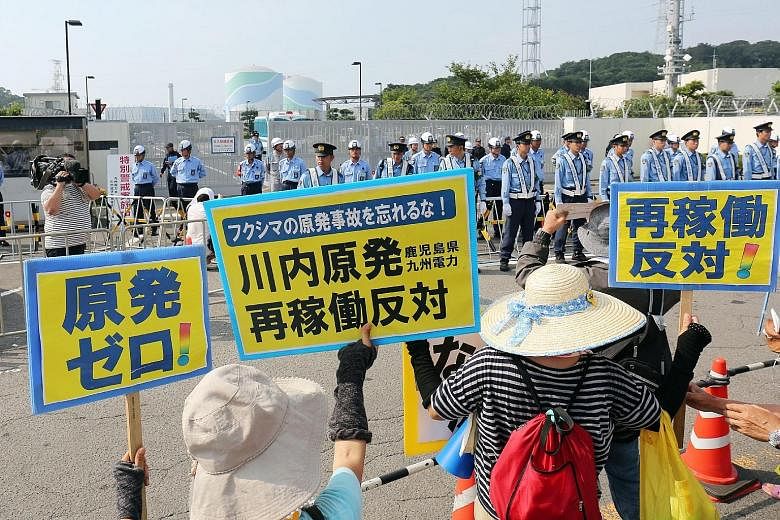TOKYO • Under much stricter guidelines, Japan will begin restarting its mothballed nuclear power programme today, more than four years after a quake-sparked tsunami triggered the Fukushima meltdowns in the world's worst atomic crisis in a generation.
Resource-poor Japan, which once relied on nuclear power for a quarter of its electricity, had fired up two reactors temporarily after the 2011 disaster but they both went offline by September 2013, making the country completely nuclear- free for about two years.
The government of Prime Minister Shinzo Abe is keen to get some of about four dozen reactors back up and running.
"It is important for the country's energy policy that the government go ahead with reactor restarts once they are confirmed as safe," top government spokesman Yoshihide Suga said yesterday. "The biggest priority is safety."
The Nuclear Regulation Authority, set up in 2012, has been pushing operators to improve safety and the mindset of personnel under new standards. The International Atomic Energy Agency rated the disaster at the Fukushima Daiichi plant, 220km north-east of Tokyo, as a Level 7 accident, the same category as the disaster at Chernobyl in the former Soviet Union.
The new regulations make provisions for the highest levels of earthquake and tsunami risk, mandating a variety of backup power sources and other comprehensive emergency measures, including higher tsunami-blocking walls in areas most susceptible to them.
Of the 25 reactors at 15 plants whose operators have applied for permission to restart them, only five reactors at three plants have met the criteria.
"A disaster like that at Tokyo Electric Power's Fukushima Daiichi nuclear plant will not occur" under the new rules, Nuclear Regulation Authority chairman Shunichi Tanaka said in an interview with the Nikkei newspaper published at the weekend. "The new regulations are incomparably (stricter) than those under the old system."
Although Mr Tanaka conceded there was "no such thing as absolute safety", he said any future crisis would "be contained before it reached a scale anywhere near what happened in Fukushima".
But ordinary Japanese are sceptical and the country remains deeply scarred by Fukushima, which forced more than 160,000 residents to flee their homes.
Yesterday, about 400 protesters rallied in front of Kyushu Electric Power's Sendai plant, nearly 1,000km south-west of Tokyo.
The 31-year-old reactor No. 1 has been loaded with atomic fuel and was expected to reach full capacity this morning. It would start generating power by Friday but regular operations would not begin until early September, a Kyushu Electric spokesman said.
AGENCE FRANCE-PRESSE, REUTERS

